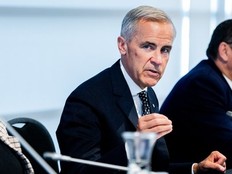Frustrated world leaders wonder if Trump even wants a deal

Article content
(Bloomberg) — With panic spreading in markets across the globe, world leaders raced over the weekend to make offers to US President Donald Trump to lower tariffs across the board.
The problem, however, is that it’s unclear what exactly Trump would find acceptable — or if he even wants to make deals at all. Trump set a high bar on Sunday night, telling reporters that any agreements would need to eliminate bilateral trade deficits.
“To me, a deficit is a loss,” Trump told reporters on Air Force One. “We’re going to have surpluses or, at worst, we’re going to be breaking even.”
The lack of clarity over Trump’s demands is adding to frustration across the capitals hardest hit by his “Liberation Day” levies, which are set to take effect on Wednesday. With tariff levels set according to deficits, rather than actual reciprocal rates, governments are in the dark about what specifically they can do to avoid getting hammered.
A White House spokesperson didn’t immediately respond to a request for comment.
Vietnam, one of the worst hit with a 46% tariff, offered to completely eliminate all duties — an approach swiftly rejected by Peter Navarro, a Trump adviser who helped craft the policy. Other governments are holding out hope they can strike a broader agreement with Trump at some point.
All eyes are now turning to Trump’s meeting on Monday with Israeli Prime Minister Benjamin Netanyahu, who saw his country hit with a 17% tariff even after announcing an end to all remaining tariffs on the US. The pair are set to hold a press briefing on Monday afternoon.
Any deal may provide other countries with a template for a similar agreement, or at least give some insight into what terms would be acceptable. It may also offer some relief for global equities, which continued to slide on Monday amid the uncertainty of Trump’s overall goals.
While investor confidence would likely benefit if Trump struck even one deal, that would also undermine the broader goal of getting companies to invest in new factories, according to Deborah Elms, head of trade policy at the Hinrich Foundation. The problem for all governments, she said, is that nothing they do can change the outcome of Trump’s formula for calculating the tariffs.
“You got the number you got no matter whether you tried or you didn’t try,” she said. “We just have wildly inconsistent demands that it’s literally impossible to satisfy potentially all of them.”
‘Bad Actors’
Treasury Secretary Scott Bessent signaled on Sunday that no deals would happen quickly even though more than 50 governments had reached out for talks with the US. The administration, he said, would need to determine if any offers were “believable.”
“They’ve been bad actors for a long time,” Bessent said on NBC’s Meet the Press with Kristen Welker. “And it’s not the kind of thing you can negotiate away in days or weeks.”
Trump’s rigid embrace of tariffs, which he called a “beautiful thing” on Sunday, has come as a surprise to many leaders and investors who saw the Art of the Deal author cut a range of agreements during his first term. At the APEC summit in Peru shortly after the November election, JPMorgan Chase & Co. CEO Jamie Dimon advised attendees who were nervous about Trump to “read his book” — saying the president would want to avoid a negative stock market reaction.
So far, Trump has shown no signs of budging despite deep losses in equity markets around the globe, including in the US. Some of his supporters, including Bill Ackman of Pershing Square, are starting to turn on him.
Weekend Stress
In Japan, Prime Minister Shigeru Ishiba huddled with top national security and foreign policy advisers over the weekend, with officials in the dark over whether Trump is willing to cut the longtime ally a break. One Japanese government official responsible for briefing senior leaders said he only got a short break at the weekend to enjoy the cherry blossoms that are now in full bloom in Tokyo.
Over in Taiwan, the steep tariff appeared to catch the government off guard, with Premier Cho Jung-tai apologizing on Friday for holding the cabinet press conference one day later than expected. On Sunday, President Lai Ching-te said Taiwan wouldn’t retaliate, and viewed “zero tariff between Taiwan and the US as a starting point” with the US-Mexico-Canada agreement as a model for talks.
In India, officials were relieved that Trump didn’t hit them harder with tariffs, and held out hope that the two governments could work out a comprehensive deal in addition to receiving relief under a clause in the executive order that allows tariff reductions for partners that align with the US and economic and national security matters. The country has already been in talks with US trade representatives, giving India what officials called a first-mover advantage.
Still, until a deal gets struck, it’s anyone’s guess as to what Trump will view as sufficient. Given the US runs a trade deficit of more than $1 trillion with the world, it would take both buying more American products or opening more to services, such as privatizing assets and selling them to US investors, according to Alicia Garcia Herrero, chief Asia Pacific economist at Natixis.
These two options are “viable but not desirable” for countries with the biggest trade deficits such Vietnam, she said. “Everybody needs to buy more American products, but I’m not even sure this is possible since the US does not produce so many things.”
—With assistance from Francesca Stevens, Yoshiaki Nohara, Erica Yokoyama, Yian Lee, Ben Westcott, Shruti Srivastava and Soo-Hyang Choi.











Postmedia is committed to maintaining a lively but civil forum for discussion. Please keep comments relevant and respectful. Comments may take up to an hour to appear on the site. You will receive an email if there is a reply to your comment, an update to a thread you follow or if a user you follow comments. Visit our Community Guidelines for more information.